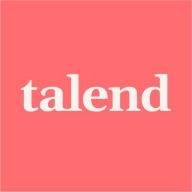

Find out in this report how the two Cloud Data Integration solutions compare in terms of features, pricing, service and support, easy of deployment, and ROI.
It has helped us save a lot of time by automating repetitive data processes and reducing manual interventions.
They didn't want to use separate ETL tools for MDM or for TMC and data preparation, which is all included in one package.
The support team is responsive when we raise issues, and they usually provide clear guidance or solutions.
The customer support for Talend Data Integration is very good; whenever I raise a ticket in the customer portal, I immediately receive an email, and follow-up communication is prompt.
By using features like job parallelization and modular design, we can expand our data flows without having to rebuild everything.
The scalability of Talend Data Integration is good; if it weren't scalable, it wouldn't be reliable.
Once the jobs are properly designed and deployed, they run reliably without major issues.
It would be great to have more ready-to-use connectors for modern cloud and SaaS platforms.
Talend Data Integration can be improved by reducing the license cost, as it is a bit high compared to other tools, which can be a burden for small-scale companies wanting to buy a license.
Regarding ETL, Talend Data Integration is great, but concerning real-time data processing, people are not really sure about Talend Data Integration or might not know how it provides such types of flexibilities.
If we could have round-the-clock support, we would be able to resolve many issues which we encounter during the development part.
My experience with Talend Data Integration's pricing, setup cost, and licensing is that it is a bit higher compared to other tools, making it not very affordable.
By automating daily data loading processes, we reduced manual effort by around three or four hours per day, which saved roughly 60 to 80 hours per month.
Flexibility is a key feature I appreciate about Talend Data Integration, especially the integration of Java within it and the ease of integrating with multiple source repositories such as GitHub and Bitbucket.
The best feature of Talend Data Integration is its multiple data DB components; we have almost all the components and also cloud versions, with TMC allowing us to perform data preparation and data stewardship.
It also comes with a console which helps us to monitor the jobs we have built in, making that monitoring part easy.
| Product | Market Share (%) |
|---|---|
| Talend Open Studio | 3.0% |
| Talend Data Integration | 1.5% |
| Other | 95.5% |


| Company Size | Count |
|---|---|
| Small Business | 2 |
| Midsize Enterprise | 2 |
| Large Enterprise | 4 |
| Company Size | Count |
|---|---|
| Small Business | 22 |
| Midsize Enterprise | 13 |
| Large Enterprise | 18 |
Talend Data Integration efficiently handles data transformation and integration with ease, supporting complex business needs. It enables seamless data management across all sources.
Talend Data Integration offers a robust platform for managing and transforming data. It connects disparate systems, enabling data flow across various environments. Users benefit from its ability to streamline processes and improve data accuracy. Its user-friendly interface and flexibility make it a preferred choice for data integration experts.
What are the key features of Talend Data Integration?In finance, Talend Data Integration enhances transaction data processing and compliance reporting. In healthcare, it ensures accurate patient data management, while in retail, it optimizes inventory and customer data analysis. Its adaptability makes it valuable across multiple sectors, addressing specific industry requirements.
Talend Open Studio is a free, open source ETL tool for data integration and Big Data. The solution enables you to extract diverse datasets and normalize and transform them into a consistent format which can be loaded into a number of third-party databases and applications.
Talend Open Studio Features
Talend Open Studio has many valuable key features. Some of the most useful ones include:
Talend Open Studio Benefits
There are several benefits to implementing Talend Open Studio. Some of the biggest advantages the solution offers include:
Reviews from Real Users
Below are some reviews and helpful feedback written by PeerSpot users currently using the Talend Open Studio solution.
Elio B., Data Integration Specialist/CTO at Asset messages, says, "The solution has a good balance between automated items and the ability for a developer to integrate and extend what he needs. Other competing tools do not offer the same grade of flexibility when you need to go beyond what is provided by the tool. Talend, on the other hand, allows you to expand very easily."
A Practice Head, Analytics at a tech services company mentions, “The data integration aspect of the solution is excellent. The product's data preparation features are very good. There's very useful data stewardship within the product. From a technical standpoint, the solution itself is pretty good. There are very good pre-built connectors in Talend, which is good for many clients or businesses, as, in most cases, companies are dealing with multiple data sources from multiple technologies. That is where a tool like Talend is extremely helpful.”
Prerna T., Senior System Executive at a tech services company, comments, “The best thing I have found with Talend Open Studio is their major support for the lookups. With Salesforce, when we want to relate our child objects to their parent object, we need to create them via IDs. Then the upsert operation, which will allow you to relate a child object to the event, will have an external ID. That is the best thing which keeps it very sorted. I like that.”
An Implementation Specialist, Individual Contributor at a computer software company, states, “I can connect with different databases such as Oracle Database or SQL Server. It allows you to extract the data from one database to another. I can structure the data by filtering and mapping the fields.” He also adds, “It is very user-friendly. You need to know the basics of SQL development or SQL queries, and you can use this tool.”
PeerSpot user Badrakh V., Information System Architect at Astvision, explains, "The most valuable features are the ETL tools."
We monitor all Cloud Data Integration reviews to prevent fraudulent reviews and keep review quality high. We do not post reviews by company employees or direct competitors. We validate each review for authenticity via cross-reference with LinkedIn, and personal follow-up with the reviewer when necessary.